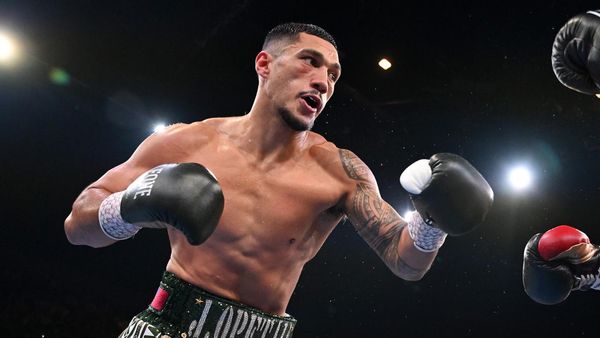
For a period in the late 1990s and early 2000s, it was impossible to walk down a main street in Australia’s capital cities and not get swept up in a ticker-tape parade. There was a swagger, and an inevitability, about our cricketers, tennis players, rugby teams and particularly our Olympians. John Howard, impervious to time zones and decked out in an interchanging array of team tracksuits, was a prime minister for this sporting epoch.
The pressure on our leg spinners, baseliners, butterflyers and full forwards could be multiplied tenfold when it came to Kuku Yalanji and Birri Gubba woman Catherine Freeman. She’d been on the national sporting radar for a decade. She’d run the great Marie-José Pérec to a few yards at the Atlanta Games. She’d been pretty much unbeatable for four years.
Now, just to crank up the heat a few hundred degrees, she’d been chosen to light the Olympic flame. Four years earlier, when the champion American distance swimmer Janet Evans ran into the Olympic Stadium, few expected her to hand the torch to Muhammad Ali. The smart money was on Mark Spitz, Edwin Moses or Michael Jordan. But there was Ali, quivering, glowing, back on top of the world. Compared with that, the following fortnight never stood a chance.

The sight of Freeman was no less arresting. As with Ali, the immediate thought was, “How the hell can anyone top that?” Unlike Ali, Freeman had a race to prepare for. In interviews, she was all giggles and frowns and upward inflections. But few athletes have been better at cocooning themselves and blocking out the noise. Few athletes hated losing more than she did.
It helped that her main rival was essentially being hounded out of country. Pérec was aloof, Amazonian, preternaturally talented and, conveniently, French. She had nothing to prove. But she had barely been sighted since cleaning up at the Atlanta Olympics. Finally fit and healthy again after overcoming Guillain-Barré syndrome, she walked into an ambush.
By English tabloid standards of the time, Australian journalists were verging on polite. But they went especially hard at the Frenchwoman. She was the only genuine threat to “our Cathy”. They smoked her out and sent her packing with lip-smacking glee. “Au Revoir Pérec,” was the headline on the front page of the Age. “Mademoiselle La Chicken” was News Ltd’s offering.

What could go wrong now? Freeman’s main rival was on the tarmac. The 400m wasn’t like the hurdles, where one errant stride could send you crashing down. It wasn’t like the 10,000m, where you could be boxed in by a trio of east Africans. The only threat was the asphyxiating public expectation, what Richard Williams in the Guardian called “a greater historical burden than any athlete since Jesse Owens”. And there was the memory of the 1995 world championships, when she got herself wound up, went out too hard, blew up in the straight and missed a medal.
When Freeman walked on to the track in Sydney, it’s hard to imagine that there’s ever been a louder roar at an Australian sporting event. She insists she barely heard it. She had a plan, and she executed it to a T. She ran within herself for 300m – conserving, floating, stalking. Still third on the bend, she turned up the wick, running the final 100m in under 13 seconds. She peeled back the zip of her running suit, pulled back the hood and simply sat. Always a perfectionist, she was disappointed with her time. She still is.

Good judges consider that evening to be the greatest exhibition of talent in the history of track and field. It was the night of Maria Mutola, Jonathan Edwards, Tatiana Grigorieva and Stacy Dragila. As Freeman completed her victory lap, one of the great athletes of the 20th century, Michael Johnson, was prowling lane six. With apologies to Proverbs 6:5, Freeman ran like a bird from the snare of the fowlers. Johnson ran as if he had a hot poker up his backside. But both had their own fluency, their own beat. Both, in the heat of an Olympic final, were killers.
Bruce McAvaney’s call of Freeman’s race was pitch perfect. He was always at his best at the Olympics. A few minutes after he interviewed her, he called the final laps of the men’s 10,000m. Ethiopia’s Haile Gebrselassie hadn’t been beaten since 1993 but was suddenly snookered and vulnerable. McAvaney, who’d had quite a night, pulled off arguably the best call of his career. Gebrselassie was the “Emperor of Ethiopia”. Freeman was something else altogether, something she never asked for, something she was never quite comfortable with. On any other night, at any other Olympics, the Ethiopian’s final 200m would have been the signature moment. On this night, in this stadium, it was a mere bonus.
So many silly things were said in the aftermath. Opposition leader Kim Beazley called it “400 metres of national reconciliation”. For Freeman, the memories are sensory – the feel of her fingernails on the synthetic track, the sensation of levitating above the track, the pounding intoxication of the stadium, the giant exhale at the end. It’s been nearly a quarter of a century. For Freeman and for anyone watching her, it feels like yesterday.







